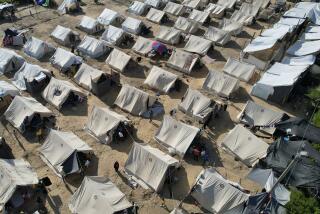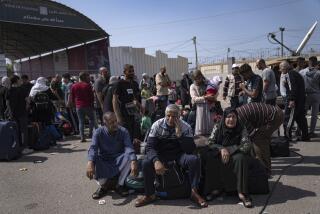Now It’s a Refugee Crisis : Because of its inaction, West must address the Bosnia issue in a new way
- Share via
The time has come to accept the fact that Serb aggression in Bosnia-Herzegovina will not be stopped any time soon and that the crisis of Bosnia must now be addressed as a refugee crisis.
Many Bosnians have already fled to Croatia. Others are fleeing to Bosnian territory under Croatian control. For, despite various proven Croat atrocities against Serbs and Muslims, there is no evidence of any extermination/expulsion policy in Zagreb.
There is, in fact, evidence to the contrary in the form of thousands of Bosnian Muslim refugees now in Croatia. Even though Croatia has ceased accepting further refugees from Bosnia, the 334,000 Bosnians already there are causing that country, with a population of only 4.5 million, to stagger under the burden. And to the Bosnian total must be added 264,000 internal refugees, Croats made homeless by the Serb-Croat war of 1991.
According to the Office of the U.N. High Commissioner for Refugees, 1,336,518--or fully 35%--of the population of Bosnia is displaced. About 268,000 Bosnian Serbs have fled to Serbia (of whom some have been resettled in Serb-captured parts of Croatia), but fully 740,000 refugees remain as a homeless population within Bosnia.
Few Bosnians, in other words, have found refuge outside the Balkans. True, the European Community had received 596,000 refugees from the former Yugoslavia as of November, 1992, but most of these were Croats fleeing the 1991 fighting.
Some observers will object that treating the displacement of the Bosnian Muslims as not a temporary but a permanent fact will ratify and encourage “ethnic cleansing.” But, for better or worse, that blow against world order has already fallen. Moving the burden of refugee resettlement to center stage will not make the political price any higher.
It may, however, lead to a more equitable sharing of the burden. Thus, of the mentioned 596,000 South Slav refugees in the European Community, 250,000 are in Germany but only 4,000 in Britain and 1,108 in France. As for the United States, though this country has agreed to accept 1,000 Bosnian refugees, only 135 have arrived.
If the Western allies had offered Bosnia a military rescue or defensive arms or even, as in Somalia, militarily guaranteed relief deliveries and a measure of in-country safety, then the Balkans question would not be so massively a refugee question. But having refused to solve the problem within Bosnia’s borders, the West must now accept the consequences outside those borders. Specifically, those who have accepted few refugees must prepare to accept more. And, unless the outflow is to become truly catastrophic, all must do more to assist Croatia proper as well as the Croatian sector of Bosnia to meet the needs of Bosnian Muslims fleeing for their lives.
More to Read
Sign up for Essential California
The most important California stories and recommendations in your inbox every morning.
You may occasionally receive promotional content from the Los Angeles Times.













